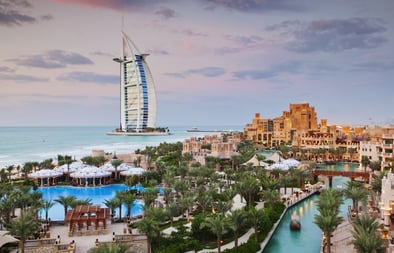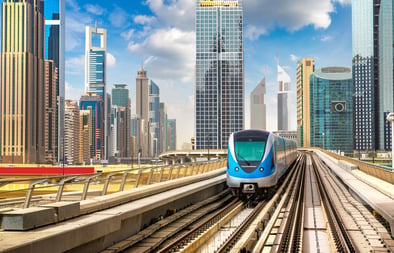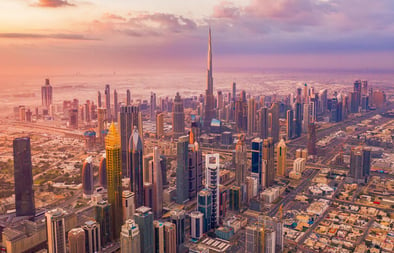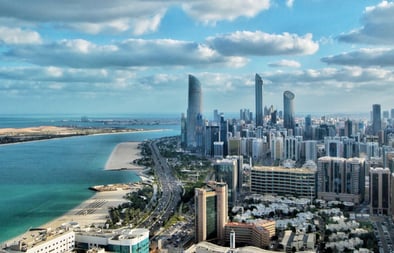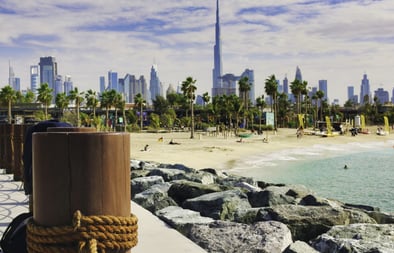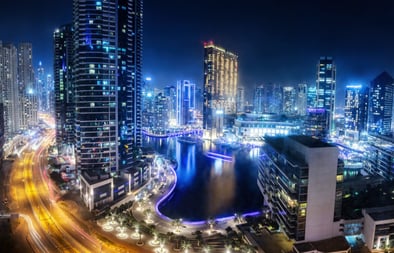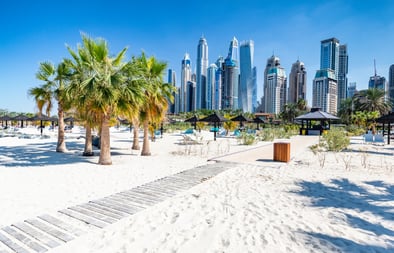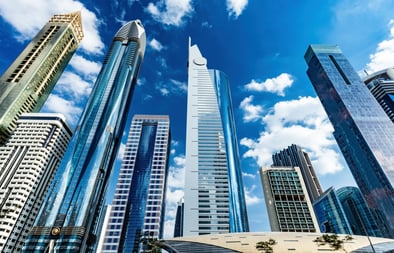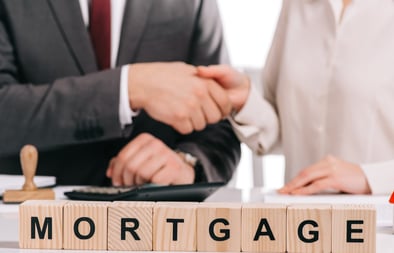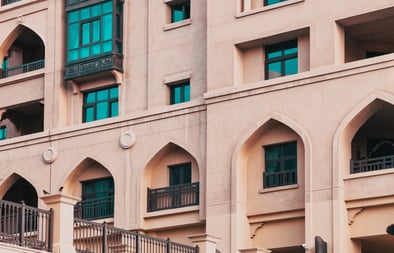Dubai, renowned for its iconic skyline, luxurious lifestyle, and thriving business environment, has firmly established itself as a global hub for commerce and industry. The city’s strategic location, positioned at the crossroads of Europe, Asia, and Africa, makes it an ideal gateway for international trade and business operations. This unique geographical advantage, combined with Dubai's world-class infrastructure, advanced transport networks, and cutting-edge technology, creates a conducive environment for business growth and expansion.
Moreover, Dubai's business-friendly policies and economic initiatives have made it an attractive destination for investors and entrepreneurs. The emirate offers a range of incentives, including tax exemptions, simplified business setup processes, and a favorable regulatory framework, which collectively enhance its appeal as a business destination. The city's diverse economy, which spans sectors such as finance, real estate, tourism, logistics, and technology, provides ample opportunities for businesses to thrive and diversify their operations.
Choosing the right commercial property in Dubai is a crucial decision that can significantly impact your business’s success. The city's real estate market is dynamic and offers a wide variety of commercial properties, from state-of-the-art office spaces in the heart of the financial district to spacious warehouses in strategically located industrial zones. Each type of property presents its own set of advantages and considerations, making it essential to align your choice with your business objectives, operational requirements, and budget.
In this comprehensive guide, we will delve into the key factors to consider when selecting a commercial property in Dubai. We will explore the importance of location, examining how proximity to key business districts, transport hubs, and client bases can influence your business operations.
Additionally, we will discuss the various types of commercial properties available, from offices and retail spaces to industrial units and mixed-use developments, highlighting the unique benefits and potential challenges of each.
Furthermore, we will provide insights into the current market trends and economic indicators that can affect your investment decision. Understanding the supply and demand dynamics, rental yields, and future growth prospects of different areas will help you make an informed and strategic investment. We will also cover legal and regulatory aspects, ensuring that you are aware of the necessary permits, licenses, and compliance requirements associated with commercial property ownership or leasing in Dubai.
This guide aims to equip you with the knowledge and tools needed to navigate Dubai’s commercial real estate market effectively. By considering the outlined factors and leveraging professional assistance, you can make a well-informed decision that aligns with your business goals and maximizes your investment potential. Whether you are a startup seeking your first office space, an established company looking to expand, or an investor exploring lucrative opportunities, this guide will provide valuable insights to help you choose the right commercial property in Dubai and contribute to your long-term business success.
Understanding the Dubai Commercial Real Estate Market
Before diving into the specifics of choosing a commercial property, it’s essential to understand the dynamics of the Dubai commercial real estate market. Dubai’s real estate market is diverse, offering various types of commercial properties, including office spaces, retail units, warehouses, and industrial facilities. The market is influenced by factors such as economic conditions, government regulations, and global trends. Staying updated with market trends and conducting thorough research will provide valuable insights into the current and future prospects of the commercial real estate sector in Dubai.
Identifying Your Business Needs
The first step in choosing the right commercial property is to clearly define your business needs and objectives. Consider the nature of your business, the type of commercial property that best suits your operations, and the space requirements. For instance, a retail business will have different needs compared to a corporate office or an industrial facility. Understanding your specific requirements will help narrow down the options and ensure that the property aligns with your business goals.
Location Matters
Location is one of the most critical factors when selecting a commercial property in Dubai. The city is divided into various districts, each with its own unique characteristics and advantages. Here are some key locations to consider:
• Downtown Dubai: Known for its iconic landmarks such as the Burj Khalifa and The Dubai Mall, Downtown Dubai is a prestigious location that offers high visibility and prestige. It is ideal for businesses seeking a prime address and access to a vibrant commercial hub.
• Business Bay: Adjacent to Downtown Dubai, Business Bay is a rapidly developing business district with a mix of commercial and residential properties. It is a popular choice for corporate offices, offering modern infrastructure and excellent connectivity.
• Dubai Marina: Dubai Marina is a waterfront community that combines residential and commercial properties. It is known for its stunning views and upscale lifestyle, making it suitable for businesses in the hospitality and retail sectors.
• Jebel Ali Free Zone (JAFZA): For industrial and logistics businesses, JAFZA offers a strategic location with easy access to major shipping routes and transport networks. It provides various incentives, including tax exemptions and full foreign ownership.
• Dubai Silicon Oasis: Dubai Silicon Oasis is a technology park that caters to businesses in the tech and innovation sectors. It offers state-of-the-art facilities and a supportive ecosystem for startups and established tech companies.
Budget and Financial Considerations
Budget and financial considerations play a pivotal role in the decision-making process when choosing a commercial property in Dubai. Establishing a clear budget is the first and most crucial step. This involves determining how much you are willing and able to spend, taking into account not only the initial purchase or rental price but also the ongoing costs associated with property ownership or leasing. These additional costs can include maintenance fees, service charges, utility expenses, insurance, and potential renovation or fit-out costs to customize the space to suit your business needs.
It's essential to conduct a thorough financial analysis to ensure that the property fits within your budget and aligns with your financial goals. This analysis should include an assessment of the total cost of ownership over time, comparing it with the projected benefits and returns. If the property is being purchased, consider the potential for appreciation in value and the expected rental income if you plan to lease it out in the future. For leased properties, evaluate the lease terms, including rent escalation clauses, to understand how your rental costs may increase over time.
When purchasing a property, exploring financing options is a critical step. Dubai offers various financing solutions, including mortgage loans from banks and financial institutions. Consulting with financial advisors can help you navigate these options, understand the terms and conditions, and choose the financing solution that best suits your financial situation and business goals. Financial advisors can also assist in evaluating the potential return on investment (ROI), ensuring that your investment is sound and will contribute positively to your business’s financial health.
Property Type and Features
Different types of commercial properties offer varying features and benefits. Depending on your business needs, consider the following property types:
• Office Spaces: Look for office spaces that provide a conducive working environment, modern amenities, and flexible layouts. Consider factors such as parking facilities, security, and accessibility for employees and clients.
• Retail Units: For retail businesses, choose properties with high foot traffic, attractive storefronts, and proximity to popular shopping areas. Consider the demographics of the area and the presence of complementary businesses.
• Warehouses and Industrial Facilities: If your business involves storage or manufacturing, prioritize properties with sufficient space, loading docks, and easy access to transport routes. Ensure that the property meets all regulatory requirements for your industry.
• Mixed-Use Developments: Mixed-use developments combine residential, commercial, and recreational spaces, offering a vibrant environment for businesses. These properties are ideal for businesses that benefit from a diverse customer base and integrated amenities.
Legal and Regulatory Compliance
Navigating the legal and regulatory landscape is a critical aspect of choosing a commercial property in Dubai, as it ensures that your investment is secure and that your business operations are compliant with local laws. Dubai’s real estate market is governed by a complex framework of laws and regulations designed to maintain order, protect investors, and promote sustainable development.
Therefore, familiarizing yourself with these regulations is paramount to avoid potential legal issues and ensure a smooth transaction process.
One of the first steps in this process is understanding the local laws that pertain to property ownership and leasing. In Dubai, properties are classified into different zones, such as freehold and leasehold areas. Freehold areas allow foreigners to buy and own property outright, while leasehold areas typically involve long-term leases. Understanding the distinctions between these zones and the specific regulations that apply to them is crucial when selecting a commercial property.
Amenities and Infrastructure
The availability of amenities and infrastructure can significantly impact the functionality and appeal of a commercial property. Look for properties that offer essential amenities such as high-speed internet, conference rooms, parking facilities, and security systems. Additionally, consider the proximity to public transport, major highways, and airports to ensure ease of access for employees, clients, and suppliers.
Future Growth and Development
Consider the future growth and development prospects of the area where the commercial property is located. Investing in a property in a developing or emerging district can offer significant advantages in terms of appreciation and business opportunities. Research upcoming infrastructure projects, government initiatives, and planned developments that could enhance the value and attractiveness of the area in the future.
Engaging Professional Assistance
Engaging professional assistance is a crucial step when navigating the commercial real estate market in Dubai. The intricacies and complexities of this market can be overwhelming, and having the support of experienced professionals can make a significant difference in your decision-making process. Real estate agents, property consultants, and legal advisors bring invaluable expertise and insights to the table, helping you identify suitable properties that align with your business objectives.
These professionals possess an in-depth understanding of the local market dynamics, trends, and regulatory landscape, which can be particularly beneficial in a city as dynamic as Dubai. Real estate agents and property consultants can provide a comprehensive overview of available properties, considering factors such as location, amenities, infrastructure, and future growth potential. They can offer tailored recommendations based on your specific business needs and budget, ensuring that you make informed choices.
Furthermore, these experts play a critical role in the negotiation process. They have the skills and experience to negotiate favorable terms and conditions on your behalf, whether you are purchasing or leasing a commercial property. Their ability to navigate complex negotiations can result in cost savings and more favorable contractual terms, ultimately benefiting your business in the long run.
Legal advisors, on the other hand, ensure that all legal aspects of the transaction are thoroughly addressed. They help you understand the legal implications of property agreements, zoning regulations, licensing requirements, and compliance issues. Their guidance can prevent potential legal pitfalls and ensure that your business operations remain smooth and uninterrupted.
The local knowledge and industry experience of these professionals cannot be overstated. They are well-versed in the nuances of the Dubai commercial real estate market, including emerging trends, popular locations, and potential investment opportunities. This knowledge allows them to provide strategic advice that aligns with your long-term business goals.
By engaging professional assistance, you save valuable time and effort that would otherwise be spent on researching, evaluating, and negotiating properties on your own. These experts streamline the process, handling the intricate details and paperwork, so you can focus on your core business activities. Additionally, their involvement minimizes risks associated with property transactions, providing peace of mind and confidence in your investment decisions.
Conclusion
Choosing the right commercial property in Dubai is a strategic decision that requires careful consideration of various factors. By understanding the market dynamics, identifying your business needs, and evaluating key aspects such as location, budget, property type, and legal compliance, you can make an informed and successful investment. Dubai’s vibrant commercial real estate market offers numerous opportunities for growth and success, and with the right approach, you can find a property that aligns with your business objectives and contributes to your long-term success. Whether you’re establishing a new business or expanding an existing one, Dubai’s commercial property market has the potential to provide a solid foundation for your business endeavors.
























